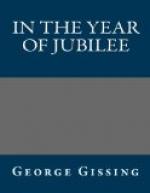Yes, there was the point—no religion. Ada had grown up to regard church-going as a sign of respectability, but without a shadow of religious faith. Her incredible ignorance of the Bible story, of Christian dogmas, often amazed him. Himself a believer, though careless in the practice of forms, he was not disturbed by the modern tendency to look for morals apart from faith; he had not the trouble of reflecting that an ignorant woman is the last creature to be moralised by anything but the Christian code; he saw straight into the fact—that there was no hope of impressing Ada with ideas of goodness, truthfulness, purity, simply because she recognised no moral authority.
For such minds no moral authority—merely as a moral authority— is or can be valid. Such natures are ruled only by superstition— the representative of reasoned faith in nobler beings. Rob them of their superstition, and they perish amid all uncleanliness.
Thou shalt not lie—for God consumes a liar in the flames of hell! Ada Peachey could lend ear to no admonition short of that. And, living when she did, bred as she was, only a John Knox could have impressed her with this menace—to be forgotten when the echoes of his voice had failed.
He did not enjoy his chop this evening. In the game of chess that followed he played idly, with absent thoughts. And before the glow of sunset had died from the calm heaven he set out to walk homeward, anxious, melancholy.
On approaching the house he suffered, as always, from quickened pulse and heart constricted with fear. Until he knew that all was well, he looked like a man who anticipates dread calamity. This evening, on opening the door, he fell back terror-stricken. In the hall stood a police-constable, surrounded by a group of women: Mrs. Peachey, her sisters, Emma the nurse-girl, and two other servants.
‘Oh, here you are at last!’ exclaimed his wife, in a voice exhausted with rage. ’You’re just in time to see this beast taken off to the lock-up. Perhaps you’ll believe me now!’
‘What is it? What has she done?’
’Stolen money, that’s what she’s done—your precious Emma! She’s been at it for a long time; I’ve told you some one was robbing me. So I marked some coins in my purse, and left it in the bedroom whilst we were at dinner; and then, when I found half-a-crown gone —and it was her evening out, too—I sent for a policeman before she knew anything, and we made her turn out her pockets. And there’s the half-crown! Perhaps you’ll believe it this time!’
The girl’s face declared her guilt; she had hardly attempted denial. Then, with a clamour of furious verbosity, Ada enlightened her husband on other points of Emma’s behaviour. It was a long story, gathered, in the last few minutes, partly from the culprit herself, partly from her fellow-servants. Emma had got into the clutches of a jewellery tallyman, one of the fellows who sell trinkets to servant-girls on the pay-by-instalment system. She had made several purchases of gewgaws, and had already paid three or four times their value, but was still in debt to the tallyman, who threatened all manner of impossible proceedings if she did not make up her arrears. Bottomless ignorance and imbecile vanity had been the girl’s ruin, aided by a grave indiscretion on Peachey’s part, of which he was to hear presently.




